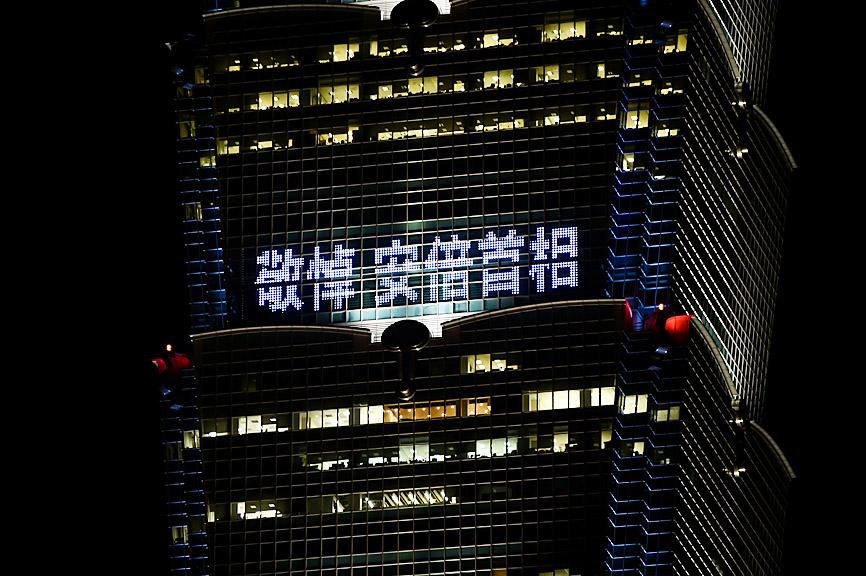The world has lost an important leader and Taiwan has lost a friend, President Tsai Ing-wen (蔡英文) said yesterday after former Japanese prime minister Shinzo Abe died hours after he was shot while giving an election campaign speech.
“Not only has the international community lost an important leader, but Taiwan has also lost an important and close friend. Taiwan and Japan are both democratic countries with the rule of law, and our government severely condemns violent and illegal acts,” Tsai said in a statement released by the Presidential Office.
Abe had spared no effort to deepen Taiwan-Japan relations and had been instrumental in convincing the Japanese government to donate COVID-19 vaccines to Taiwan, Presidential Office spokesman Xavier Chang (張惇涵) quoted Tsai as saying.

Photo: Tu Chien-jung, Taipei Times
Tsai has instructed Minister of Foreign Affairs Joseph Wu (吳釗燮) and Representative to Japan Frank Hsieh (謝長廷) to pay condolences to Abe’s family on behalf of the government, Chang said.
The Ministry of Foreign Affairs said it has instructed the Taipei Economic and Cultural Representative Office in Japan to issue formal condolences to the Japanese government on behalf of Taiwan.
Abe has been a great friend of Taiwan and spoke out for the nation on multiple occasions, such as urging other countries to adjust policies of “strategic ambiguity” toward Taiwan, instead saying that they would come to the nation’s defense, the ministry said.
Hsieh said that he and Taiwan-Japan Relations Association Chairman Su Jia-chyuan (蘇嘉全) only last week visited Abe to deliver an invitation to visit Taiwan later this month.
Hsieh said Abe had agreed to a visit. “I cannot believe that was my last meeting with him,” he added.
Abe’s passing was similar to a close family member passing away, Hsieh added.
The Chinese Nationalist Party (KMT) also extended condolences to Abe’s family and strongly condemned violence, saying that acts contravening the basic principles of a democratic society and rule of law are unacceptable.
The KMT regrets that Japan has lost a capable leader and politician, it said in a statement, adding that it is saddened Taiwan has lost a good friend.
“Abe is forever Taiwan’s good friend,” KMT Chairman Eric Chu (朱立倫) said in a separate short video.
The New Power Party expressed condolences and said that Abe’s policies were friendly toward the US and Taiwan, while being decisively critical of China and North Korea.
Abe’s actions contributed to Japanese society becoming increasingly Taiwan-friendly, it said.
The Taiwan People’s Party offered condolences to Japan, calling Abe “Taiwan’s old friend.”
His passing will hopefully not affect Taiwan-Japan relations, it said, urging the two countries to continue maintaining a strong friendship.
Additional reporting by Reuters, Yang Cheng-yu and Wang Chien-hao

The Central Election Commission has amended election and recall regulations to require elected office candidates to provide proof that they have no Chinese citizenship, a Cabinet report said. The commission on Oct. 29 last year revised the Measures for the Permission of Family-based Residence, Long-term Residence and Settlement of People from the Mainland Area in the Taiwan Area (大陸地區人民在台灣地區依親居留長期居留或定居許可辦法), the Executive Yuan said in a report it submitted to the legislature for review. The revision requires Chinese citizens applying for permanent residency to submit notarial documents showing that they have lost their Chinese household record and have renounced — or have never

A magnitude 5.6 earthquake struck off the coast of Yilan County at 12:37pm today, with clear shaking felt across much of northern Taiwan. There were no immediate reports of damage. The epicenter of the quake was 16.9km east-southeast of Yilan County Hall offshore at a depth of 66.8km, Central Weather Administration (CWA) data showed. The maximum intensity registered at a 4 in Yilan County’s Nanao Township (南澳) on Taiwan’s seven-tier scale. Other parts of Yilan, as well as certain areas of Hualien County, Taipei, New Taipei City, Taoyuan, Hsinchu County, Taichung and Miaoli County, recorded intensities of 3. Residents of Yilan County and Taipei received

Taiwan has secured another breakthrough in fruit exports, with jujubes, dragon fruit and lychees approved for shipment to the EU, the Ministry of Agriculture said yesterday. The Animal and Plant Health Inspection Agency on Thursday received formal notification of the approval from the EU, the ministry said, adding that the decision was expected to expand Taiwanese fruit producers’ access to high-end European markets. Taiwan exported 126 tonnes of lychees last year, valued at US$1.48 million, with Japan accounting for 102 tonnes. Other export destinations included New Zealand, Hong Kong, the US and Australia, ministry data showed. Jujube exports totaled 103 tonnes, valued at

BIG SPENDERS: Foreign investors bought the most Taiwan equities since 2005, signaling confidence that an AI boom would continue to benefit chipmakers Taiwan Semiconductor Manufacturing Co’s (TSMC, 台積電) market capitalization swelled to US$2 trillion for the first time following a 4.25 percent rally in its American depositary receipts (ADR) overnight, putting the world’s biggest contract chipmaker sixth on the list of the world’s biggest companies by market capitalization, just behind Amazon.com Inc. The site CompaniesMarketcap.com ranked TSMC ahead of Saudi Aramco and Meta Platforms Inc. The Taiwanese company’s ADRs on Tuesday surged to US$385.75 on the New York Stock Exchange, as strong demand for artificial intelligence (AI) applications led to chip supply constraints and boost revenue growth to record-breaking levels. Each TSMC ADR represents